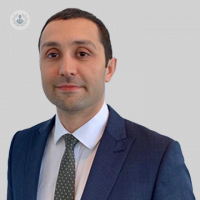FAQs on anti-reflux surgery
Written in association with:Did you know that heartburn affects up to 25% of UK adults? For some, symptoms may be extremely unbearable and may indicate gastroesophageal reflux disease (GERD).
We recently spoke with Mr Nima Abbassi-Ghadi, a highly experienced general and oesophago-gastric surgeon, to discuss the option of anti-reflux surgery and found out when it would be suitable to have this procedure.

How does anti-reflux surgery work?
Patients experience gastro-oesophageal reflux disease (GORD) due to laxity or disruption of the lower oesophageal sphincter, which allows stomach acid to enter the oesophagus and cause the typical symptoms of heartburn or reflux. This disruption is commonly due to a hiatus hernia.
The various types of anti-reflux surgery aim to restore the normal function of the lower oesophageal sphincter and prevent acid entering the oesophagus. To date, the ‘gold standard’ and the only operation with evidence for long term success is gastric fundoplication. The surgery involves repair of a hiatus hernia if present, followed by using the top part of the stomach to wrap around the lower oesophagus to form a functional lower oesophageal sphincter (reflux barrier).
Is anti-reflux surgery a last resort for treating GORD?
Treatment of GORD should be tailored to your specific needs. By consulting an expert who can appropriately investigate and choose from a range of treatments, then the correct evidence-based option can be chosen.
Surgery is not a last resort and is a suitable option for: the long-term management of GORD rather than taking daily medication; persistent unresolved GORD symptoms or related damage to the oesophagus despite the use of medication; or for significant structural disruption at the hiatus (i.e. large hiatus hernia).
How is antireflux surgery performed? (anaesthesia, duration, team, procedure etc.)
Laparoscopic/Robotic fundoplication is performed under a general anaesthetic and takes approximately 1.5 to 2 hours. It is performed as a keyhole operation through five small incisions (5-10mm).
Post-operatively, you may experience some shoulder tip pain and discomfort at the incision sites, which can be controlled with pain relief. You will require a one-night post-operative stay and will be discharged home with a modified diet for a period of 4 weeks.
You can expect to go back to work or your normal routine in two weeks, depending on your job role. Vigorous exercise, sport, and lifting heavy objects should be avoided for about six weeks after surgery.
You will have dissolvable sutures and adhesive dressings, allowing you to shower post-operatively.
Are there risks of having anti-reflux surgery?
As with any operation, general complications include a low risk of infection, bleeding, and venous thrombo-embolism (<1%). Although rare, specific complications include a risk of damage to surrounding organs such as the oesophagus, lung, or spleen.
Side effects specific to anti-reflux surgery may include difficulty in swallowing food, which often resolves spontaneously over a period of 6 to 12 weeks. Some patients experience symptoms of bloating and difficulty in belching, however the type of partial fundoplication we form has been shown to reduce this. Other side effects include temporary weight loss.
What is the success rate of anti-reflux surgery?
Patients often experience complete resolution of their reflux symptoms post-operatively and medications are discontinued. Long-term trials have shown that 90% of patients are symptom free at 10 years and 60% remain off medication at 17 years of follow-up.
If you feel you may benefit from treatment for gastro-oesophageal reflux disease, we recommend getting in touch with an expert in this condition such as Mr Nima Abbassi-Ghadi .


